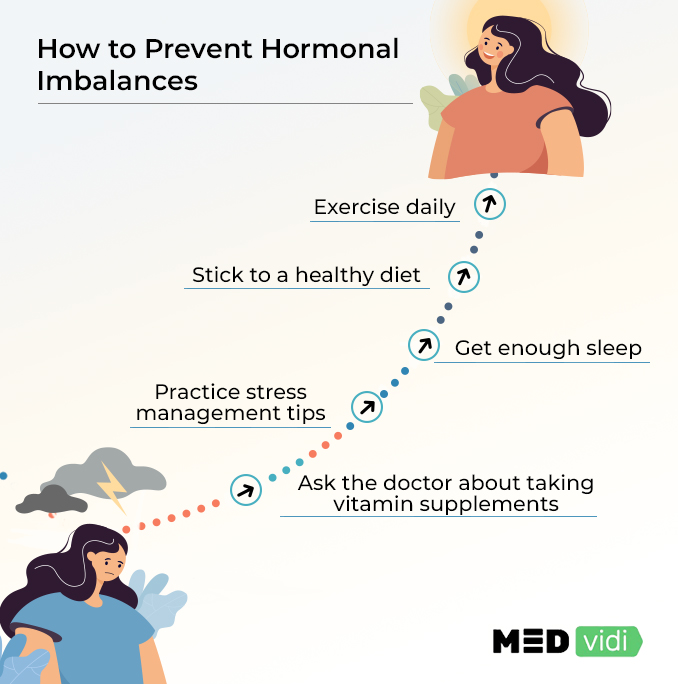The body’s endocrine system contains many glands that secrete various hormones and chemicals in the body and regulate different functions, such as metabolism, mood, sexual health, and reproductive function. They have a powerful effect on brain chemistry, mood, and mental health, and their imbalance can cause not just physical but also mental illnesses.
Hormone dysregulation often occurs when there is overproduction or underproduction of hormones by the endocrine glands. As a result, an imbalance of hormone levels in the body can trigger or worsen various symptoms like anxiety, depression, insomnia, hot flashes, or mood fluctuations, especially in women. This article will cover the types of hormones that affect your mental health, their mode of action, and strategies to protect yourself from hormonal fluctuations. So, read on to learn more!
See a mental health professional to know if your emotional state requires treatment.
Common Hormones that Influence Mental Health
There are different kinds of hormones that affect mental health. They include:
Thyroid and Parathyroid Hormone
Thyroid hormone is actually a mixture of two hormones that your thyroid gland produces: thyroxine (T4) and triiodothyronine (T3). There is a strong link between thyroid hormone imbalance and mental health problems. Thyroid imbalance can occur for various reasons, including autoimmune conditions, iodine deficiency, inflammation, or even cancer. This disruption of the homeostasis of thyroid hormones in the body can cause people to experience changes in their behavior, eating habits, and sleep patterns and, in some cases, lead to feeling depressed or anxious.
Additionally, the gland that controls the production of thyroid hormones is like a gas pedal that controls the body’s internal combustion engine. When the thyroid is overactive, it can cause anxiety, similar to drinking too much coffee or other stimulants. On the other hand, when the thyroid is underactive, it can lead to depression-like symptoms, i.e., lethargy, fatigue, weight fluctuations, etc.
Thyroid dysfunction treatment depends on the type and cause of the disorder and mainly consists of medications, radiotherapy, and surgery.
Changes in parathyroid hormone can also cause problems with mood. Parathyroid hormones, secreted by parathyroid glands (located behind the thyroid gland), regulate calcium levels in the body. Their low levels can lead to
Estrogen and Progesterone
Female reproductive hormones play a critical role in the mental health of women. The levels of
Menopause is also a time when the female body undergoes some pretty drastic hormonal changes. When ovaries stop producing estrogen and progesterone hormones, hormone levels may drop to less than 50% of what they were before, leading to symptoms of hormone imbalance and stress.
In women, hormonal dysfunction can present with the following symptoms:
- Depressed mood
- Anxiety
- Persistent mood swings
- Muscle aches, weakness, and stiffness
- Sleep disturbances (insomnia and fatigue)
- Confusion and concentration problems
- Hot flashes, night sweats
- Dry skin
- Low sex drive
- Period problems (irregularity, pain)
- Infertility
- Weight gain or weight loss
Hormone therapy can help women experiencing symptoms like hot flashes, dry skin, insomnia, or mood swings related to diminished hormone levels. Hormones may be replaced with substances essentially similar to estrogen, progesterone, and testosterone.
Estrogen and progesterone can be prescribed separately or together to help people have a healthy mood. Many women find that taking a birth control pill containing estrogen, progesterone, or both improves their mental health even after menopause. Only a qualified doctor can recommend the best treatment plan based on your symptoms.
Our doctors will conduct a comprehensive assessment of your symptoms and make a legit diagnosis. Contact us today to get help.
Testosterone
Testosterone is one of the most important sex hormones produced by men. Testes produce over
Women also produce testosterone. Ovaries produce testosterone and estrogen, which are important for the health of our bodies. The ovaries and adrenal glands release relatively small amounts of testosterone in your bloodstream. Besides being produced by the ovaries, estrogen is also produced by the fat cells of your body.
It’s been shown that testosterone hormonal imbalances can cause anxiety and other mental health problems. Women’s hormones affect their brain chemistry, mood, and mental health. Women need to have healthy levels of estrogen, testosterone, and progesterone because these hormones play an important role in their health and emotions. When some of these hormones are deficient, they can contribute to or worsen existing mental health conditions.
Low testosterone levels in men can cause poor moods, irritability, and poor concentration after age 60. Testosterone levels in men are highest when they are between the ages of 20 and 30. As men age, their testosterone levels gradually start to decline. Being overweight or having certain medical conditions can cause a bigger drop in testosterone levels.
Doctors can recommend testosterone replacement therapy for people experiencing symptoms of low testosterone levels in the body. The therapy can be delivered through skin patches, gels, oral capsules, or injections.

Stress Hormones
Stress hormones can also cause anxiety and depression. Common stress hormones include
Stress can be managed using diverse techniques. Ask a therapist about beneficial coping skills you can implement in your day-to-day life.
Lifestyle Modifications to Prevent Hormonal Imbalances
The following changes in your lifestyle may help to prevent sudden fluctuations in hormone levels:
- Practice stress reduction techniques like meditation.
- Stick to a healthy diet with limited refined carbohydrates and sugars.
- Get at least 20-30 minutes of light exercise daily.
- Ask the doctor about taking vitamin supplement inositol; or eat fruits rich in minerals and antioxidants, e.g., cantaloupes, citrus fruits, etc.
- Get 7-9 hours of sleep daily.
- Try to avoid alcohol and smoking.
When to Seek Help from a Doctor
If you have extreme mood swings that affect your ability to function normally, you should get help. Some people become very hopeless or experience a complete lack of interest in doing things they previously enjoyed. Having too much anxiety can be a crippling disease. Fortunately, there are some very effective treatments for hormonal imbalance. Contact us today to schedule a consultation with our specialist.













